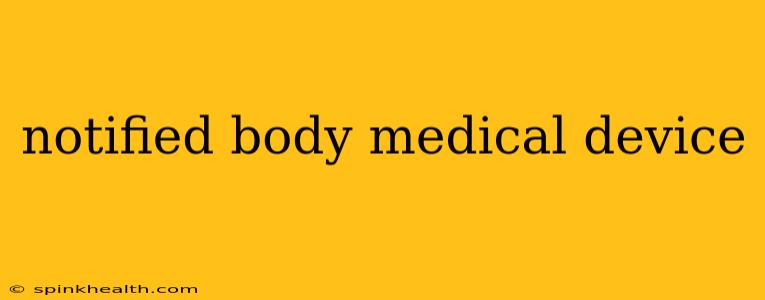The world of medical devices is complex, regulated, and vitally important. At the heart of this regulatory landscape sits the notified body, a critical component ensuring the safety and efficacy of the products we rely on for our health. But what exactly is a notified body, and why are they so crucial in the medical device industry? Let's unravel this mystery.
Imagine a world where medical devices weren't rigorously vetted before hitting the market. The potential consequences are chilling – faulty pacemakers, unreliable diagnostic tools, and potentially life-threatening malfunctions. This is where notified bodies step in, acting as independent watchdogs to prevent such scenarios.
What is a Notified Body for Medical Devices?
A notified body is a private organization designated by a member state of the European Union (EU) or other regulatory bodies to assess the conformity of medical devices with relevant directives and regulations. They are essentially the independent experts who verify that manufacturers meet the stringent requirements for safety and performance before a device can be legally sold within the EU and often beyond. Think of them as the gold standard of quality assurance in the medical device world. Their role isn't merely bureaucratic; it's a crucial safeguard for public health.
Their work is multifaceted, ranging from reviewing design documentation to witnessing manufacturing processes and performing audits. They provide an independent and objective assessment, ensuring that devices meet the necessary standards for quality, safety, and performance.
What Does a Notified Body Do?
The responsibilities of a notified body are extensive and crucial to the safety and reliability of medical devices. They encompass several key areas:
- Conformity Assessment: This is the core function. Notified bodies evaluate manufacturers' technical documentation, perform inspections of manufacturing processes, and verify that devices meet all applicable regulatory requirements. This involves rigorous testing and audits to ensure the device is safe, effective, and performs as intended.
- Certification: Once a notified body is satisfied that a medical device meets all the necessary standards, they issue a certificate of conformity. This certificate is essential for placing the device on the market within the EU. Without it, the device cannot be legally sold.
- Surveillance: The role of a notified body doesn't end with certification. They conduct ongoing surveillance activities to ensure that manufacturers maintain compliance with the regulations and that the certified devices continue to meet the required standards. This can involve periodic audits and inspections.
How Are Notified Bodies Selected and Designated?
The selection and designation process for notified bodies is rigorous and regulated. Competent authorities within each EU member state assess and approve potential notified bodies based on their expertise, resources, and experience. This ensures that only qualified and trustworthy organizations are granted this crucial responsibility.
What is the Difference Between a Notified Body and a Certification Body?
While the terms are often used interchangeably, there is a subtle difference. A certification body is a broader term encompassing organizations that certify products against various standards. A notified body is a specific type of certification body designated by a government authority to assess compliance with medical device regulations. The key distinction lies in the legal authority and the specific regulations they enforce.
What are the Responsibilities of Medical Device Manufacturers Regarding Notified Bodies?
Manufacturers bear the primary responsibility for ensuring their devices comply with all applicable regulations. However, working with a notified body is essential to demonstrate this compliance to the regulatory authorities. This collaboration involves providing comprehensive documentation, allowing for inspections, and addressing any deficiencies identified by the notified body. This collaborative approach is vital for bringing safe and effective medical devices to market.
How to Choose a Notified Body?
Selecting the right notified body is a crucial decision for medical device manufacturers. Factors to consider include:
- Expertise: Ensure the notified body has specific expertise in the type of medical device you manufacture.
- Reputation: Choose a reputable organization with a proven track record of excellence.
- Geographic Location: Consider the notified body's location in relation to your manufacturing facilities and your target market.
- Cost: While cost is a factor, it should not be the primary determining factor; prioritize expertise and reputation.
Navigating the world of notified bodies can feel daunting, but understanding their crucial role is vital for anyone involved in the medical device industry. Their dedication to rigorous testing and oversight ensures that patients worldwide receive the safe and reliable medical technology they deserve.

